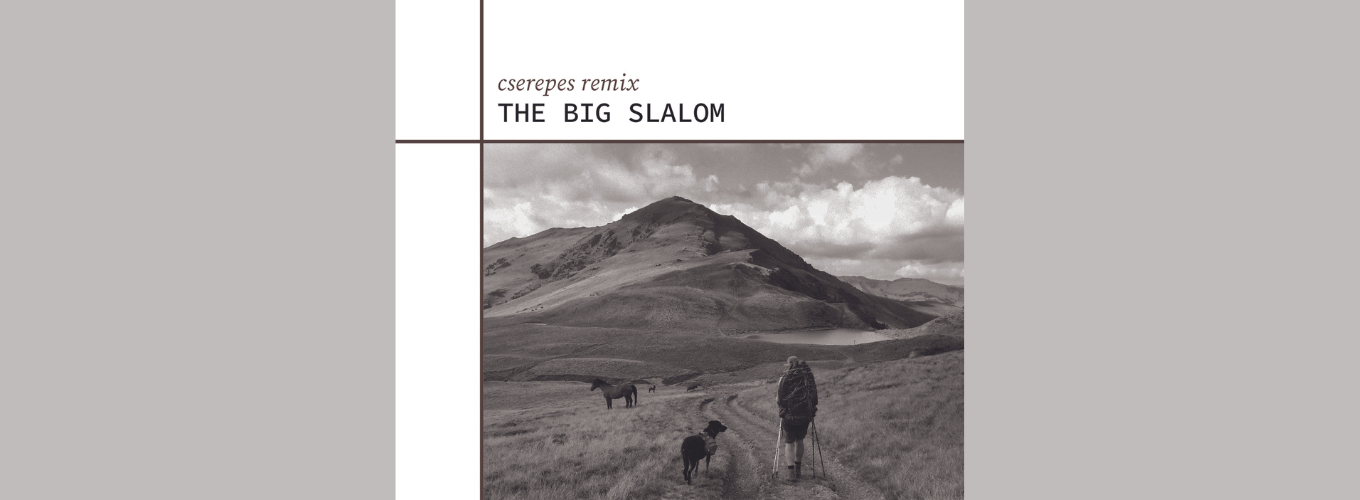
Cserepes: The Big Slalom
“The Big Slalom” is a journey in the Carpathian Basin amongst our musical roots. Károly Cserepes places sound recordings of traditional music in an unusual musical environment; without changing the original forms he drapes them in different robes through digital technology. The original recordings interact and converse with one another creating a new musical fabric, rearranging it, resulting in an exotic sound for modern folk. Cserepes’s goal is to offer treasures of folk music usually only available to the small circle of those in the ethnomusicology profession, to a wider audience.
“If we are curious about traditional music today of the peoples living in the Carpathian Basin, the best thing to do is to start our tour where Bartók started his comparative folk music research and collection work 100 years ago.
So, let The Big Slalom begin in the Maramureș Mountains.
With Bohumil Hrabal, The Big Slalom meant a certain kind of descent down the streets of Prague, with resting places in various famous beer halls; but our path takes us through the mountains, stopping here and there for a taste of the music of the people living there.
It soon becomes clear that even though the locations lie very close to one another, each one has a unique musical character and world of taste specific to them only. There are typical themes and melody types that every musician living there knows and plays as music of the present.
For the material heard here, a unique remix technique makes it all possible; meaning that one “story” or another can be told by several musicians, as one takes up another’s story or melody.
Since Slovak folk music had a great influence on Bartók’s work and career, after Maramureș we head in the direction of Terchová. But since we have to go through Ukraine to get there, we must stop to hear the Hutzul musicians. Here the “one sentence” tradition is more obvious: we find pretty much one type of melody, but with an infinite number of current text variations.
In Northern Slovakia’s Terchová, the musicians play many kinds of melodies in basically just one unusual tonal system (Lydian mode). Because of its completely distinctive musical character, Terchovská muzika has become part of UNESCO’s world heritage.
Coming down out of the mountains now, we cut across Hungary heading south. Here in the middle of the country, we find living tradition only in the music of the Gypsies (Romani). Several styles mix in, or sound together in that melting pot: traditional Gypsy music, so-called restaurant Gypsy music and today’s Hungarian party pop.
The special features of the music of Hungary’s old „Dunántúl” or Danube region (for example the "Dunántúl third") can only be reconstructed today from archive recordings.
While we’re still out and about, let’s drop in on our Serbian neighbors. Vlasko kolo is a dance played by all musicians at dance events. Everyone plays the same thing, but all of them play it differently, to exhaustion. Thanks to modern technology and modern instruments (accordion, flugelhorn, saxophone, drum, bass) we have arrived to the present. We hear living tradition and today’s penetrating sound.
But there are surprises along the way. Originally we didn’t want to stray beyond Hungary’s immediate neighbors…but after the Serbian kolos we had to visit the Vlachs.
We weren’t disappointed: here the most archaic music can be heard on the street and in the squares with the most modern sound. They don’t preserve the tradition - they use it, today, as their own.” (From the CD-booklet)
1. Bartók Romanian Dances (Romania) 5,55
2. Bǎrbǎtesc (Romania) 7,35
3. Hutsulka (Ukraine) 6,03
4. Terchovsk. Muzika (Slovakia) 6,02
5. Csángó Girl (Hungary) 4,48
6. István Csirke (Hungary) 5,29
7. Vlasko Kolo (Serbia) 7,37
8. Vlach Music (Greece) 9,07
Külön köszönet szomszédaink nagyszerű zenészeinek Special thanks to the marvellous musicians of our neighbours!
All music composed, recorded and mixed by Karoly Cserepes in Budapest, 2020.
Cover photo: Gabriella Varjas - MiraDonna.hu
Cover design: Dóra Kiss Pre press: Marianne Szilasi
p + © 2020 Fonó Music Hall





